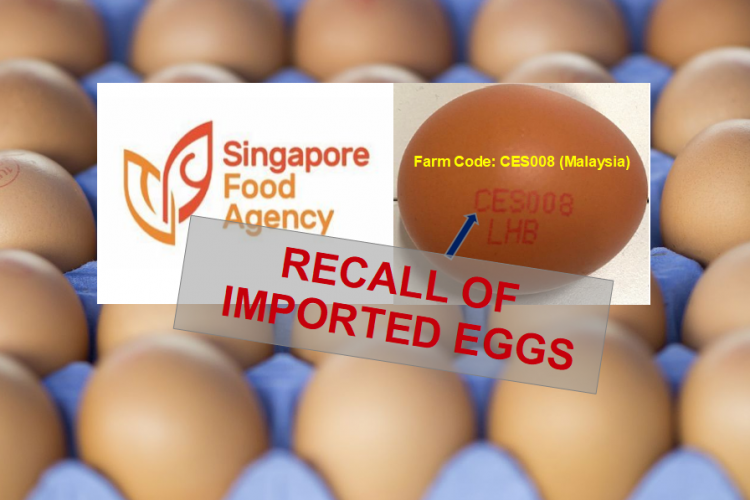The Singapore Food Agency (SFA) has detected the presence of Salmonella Enteritidis (SE) in eggs imported from Lay Hong Berhad Layer Farm Jeram in Malaysia.
As SE may cause foodborne illness if food is consumed raw or undercooked, SFA has directed the importers to recall the product as a precautionary measure.
The recall is ongoing.
The farm is also suspended and SFA will lift the suspension only when the farm has rectified the SE contamination issue.
[RECALL OF EGGS] SFA has detected the presence of Salmonella Enteritidis (SE) in eggs imported from Lay Hong Berhad…
Posted by Singapore Food Agency (SFA) on Friday, March 12, 2021
2. As SE can be destroyed by heat, eggs are safe to consume if they are cooked thoroughly. SE can survive in raw and undercooked eggs and may cause foodborne illness.
The symptoms include diarrhoea, abdominal pain, fever, nausea and vomiting. While the infection typically subsides within a week in most people, SE can cause serious infection in vulnerable population such as the elderly, young children and those with weakened immune systems.
3. Consumers who have purchased the affected eggs are advised to cook them thoroughly before consumption.
Those who have consumed the eggs and are unwell should seek medical attention.
Table 1: List of Importers
1. Ang Seng Eggs Supplier
2. Dasoon Pte Ltd
3. Heng Guan Food Industrial Pte Ltd
4. Lam Leng Trading Co
4. The affected eggs can be identified by the stamp “CES008” on the eggs. Details of the implicated product are as follows.

Issued by the Singapore Food Agency
12 March 2021
Refer to Official Media Release HERE.
Annex 1 How do we ensure eggs in Singapore are safe to eat?
Eggs imported into Singapore must come from accredited sources that meet SFA’s food safety and animal health standards.
As part of our accreditation criteria and import conditions, farms need to be free from SE. Local egg farms are also required to have in place good farm management practices and strong biosecurity measures to prevent the risks of SE contamination.
These include having a grading system to remove soiled and/or cracked eggs, and regularly testing their hens for SE to remove eggs of SE-infected flocks from sale.
Both imported and local eggs are subject to our food safety surveillance programme, which includes inspection and testing.
How do we reduce the risk of food poisoning caused from SE in eggs?
SE can be present inside the egg, as well as on the egg shell. While we cannot tell if eggs are contaminated just by looking at it, we can reduce the risk of SE infection by ensuring that eggs are cooked thoroughly until the egg white and yolk are solid, and practising proper hygienic practices to prevent cross-contamination with other food.
More information on “Salmonella and Eggs” can be found on SFA website.




